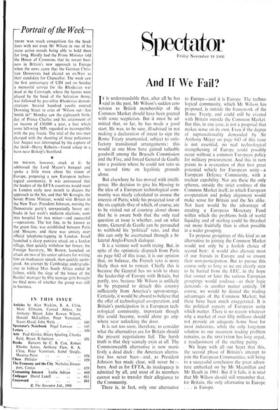Portrait of the Week
MR WILSON, however, stuck at it : he addressed the Lord Mayor's banquet and spoke a little more about his vision of Europe, proposing a new European techno- logical community. It wis announced that the leaders of the EFTA countries would meet in London early next month to discuss the approach to the Six, and that Mr Kosygin, the Soviet Prime Minister, would visit Britain in the New Year. President Johnson, nursing the Democratic party's unexpectedly heavy set- backs in last week's midterm elections, went into hospital for two minor—and successful —operations. The hot line, to be known as the green line, was established between Paris and Moscow, and there was anxiety over official telephone-tapping in London. Israel launched a sharp punitive attack on a Jordan village, then quickly withdrew her forces; the Foreign Secretary, Mr Brown, launched an attack on two of his senior advisers for writing him an inadequate speech, then quickly apolo- gised. An attempt by Cambridge undergradu- ates to kidnap Miss South Africa ended in failure, while the siege of the house of the Beatles' manager by fifty teenage girls brought no final news of whether the group was still in business.
IN THIS ISSUE
Articles by Alan Watkins, R. A. Cline, Marc Ullmann, Conrad Ahlers, Sir Anthony Meyer, John Rowan Wilson, Donald McLachlan, Peter Vansittart,
Stuart Hood, John Wells .. 640 Spectator's Notebook Nigel Lawson 645 Letters .. 650 Arts Paul Grinke, Hilary Spurling, Charles Reid, Bryan Robertson .. 651 Books Reviews by C. B. Cox, Robert Rhodes James, Anthony Flew, R. A. Cline, Peter Vansittart, Isabel Quigly, Maurice Prior .. .. 654 Chess Philidor 659 The Economy and the City Nicholas Daven- port, Custos 659 Consuming Interest Leslie Adrian 660 Endpaper David Lazell 661
Crossword .. 661 © The Spectator Ltd., 1966
And If We Fail?
IT is understandable that, after all he has said in the past, Mr Wilson's sudden con- version to British membership of the Common Market should have been greeted with some scepticism. But it must be ad- mitted that, so far, he has made a good start. He was, to be sure, ill-advised in not making a declaration of intent to sign the Rome Treaty unamended, subject to satis- factory transitional arrangements: this would at one blow have gained valuable goodwill among the Brussels Commission and the Five, and forced General de Gaulle into a position where he could not veto us a second time on legalistic grounds alone.
But elsewhere he has moved with intelli- gence. His decision to give his blessing to the idea of a European technological com- munity was nicely calculated to arouse the interest of Paris; while his projected tour of the six capitals (five of which, of course, are to be visited out of courtesy alone) shows that he is aware both that the only real question at issue is whether, and on what terms, General de Gaulle can be persuaded to withhold his 'political' veto, and that this can only be ascertained through a bi- lateral Anglo-French dialogue. - _ Friday November 18 1960 to Europe—and it is Europe. The techno- logical community, which Mr Wilson has proposed, is outside the framework of the Rome Treaty, and could still be created with Britain outside the Common Market. But this, in any case, is not a proposal that makes sense on its own. Even if the degree of supranationality demanded by Sir Anthony Meyer on page 643 of this issue is not essential, no real technological strengthening of Europe could possibly occur without a common European policy for military procurement. And this in turn points to a re-creation of that first great potential vehicle for European unity—a European Defence Community, with a nuclear capability. Nor are these the only spheres, outside the strict confines of the Common Market itself, in which European co-operation and policy alignment would make sense for Britain and the Six alike. Not least would be the advantage of creating a European Monetary Fund within which the problems both of world liquidity and of sterling could be thrashed out more fruitfully than is often possible in a wider grouping.
To propose groupings of this kind as an alternative to joining the Common Market would not only be a foolish choice of second best: it would also alienate most of our friends in Europe and so ensure their non-participation. But to pursue this course only so long as we arc clearly seen to be barred from the EEC, in the hope that sooner or later the various European groupings would coalesce—as their logic demands--is another matter entirely. Of course, we would be denied the trading advantages of the Common Market; but these have been much exaggerated. It is the political aspects of European unity which matter. There is no reason whatever why a market of over fifty millions should not provide an adequate home base for most industries, while the only long-term solution to our recurrent trading problem remains, as the SPECTATOR has long urged, a readjustment of the sterling parity.
We hope with all our heart that this, the second phase of Britain's attempt to join the European Communities, will bring to a successful conclusion the great adven- ture embarked on by Mr Macmillan and Mr Heath in 1961. But if it fails, it is vital that Mr Wilson should still remember that. for Britain, the only alternative to Europe . . . is Europe.






























 Previous page
Previous page